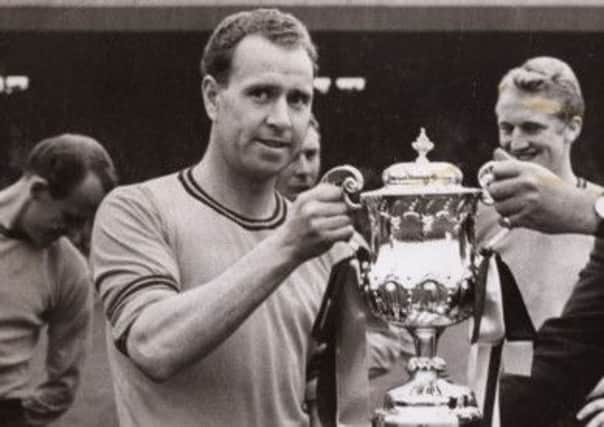Obituary: Andrew ‘Jock’ Davidson, footballer


If ever a player deserved the epithet of “one club man” it was Andrew Davidson, the Scot whose entire career was spent with Hull City where his loyalty and leadership qualities are still revered.
At the time of his death at the weekend, Davidson, always known as Andy by his friends and Jock by colleagues and fans, held the record for most appearances in competitive matches for Hull City, some 579 in total over 16 seasons. Given the brevity of footballers’ contracts these days, it is a record that is unlikely ever to be beaten.
Advertisement
Hide AdAdvertisement
Hide AdIn some quarters he was known as Mr Hull City, just as his relative, the legendary Scottish manager Bill Shankly, was Mr Liverpool. Unlike “Shanks”, however, Davidson earned his nickname for his exploits as a player.
Like Shankly and so many young men of his time, football was to be Davidson’s escape from a life in mining, and it was one that he took gratefully.
Born one of three children in the small village of Douglas Water in Lanarkshire where the local mines were by the far the main source of employment, Davidson excelled at football at school, and set his heart on a career as a professional footballer.
In later years he would tell the story of how his miner father took him down a local pit one day, and the experience was enough to put him off the thought of ever working in the mines.
Davidson’s elder brother David was also an accomplished footballer and had signed for Hull City after the Second World War. He mentioned to Hull’s then manager Frank Buckley that his younger brother might be worth a trial and, suitably impressed, Buckley signed the 14-year-old. Under new manager Raich Carter, Davidson thrived and looked poised to make his first team debut at the age of only 16.
At that point both Rangers and Celtic were interested in signing Davidson, but the latter club backed off on learning that the family were all Rangers supporters – they had been misinformed because Davidson himself supported Celtic.
That was part of the reason he did not join the Ibrox giants, but mainly he stayed at Hull because he had developed a great liking for the club and its city, an affection he never lost.
Manager Carter then arranged for Davidson to do his National Service with the RAF just up the road at Doncaster, and it was while playing for Hull reserves while there that Davidson broke his leg for the first time. He fought back from the injury and on leaving the RAF he returned full-time to Hull City, making his first team debut in September, 1952.
Advertisement
Hide AdAdvertisement
Hide AdHaving been a left-half at school, Davidson made his bow for the first XI as a centre-forward, and then played at both right- and left-half before he was selected at right-back to cover for an injured player.
He was an immediate success at right-back, and though Davidson himself always thought he was better on the left side, he played in the No. 2 jersey for most of the rest of his career. His spell at centre-forward did him some good, however, as he would take plenty penalties for Hull, scoring 19 goals in all.
Strong and combative, Davidson survived two more broken legs in the early part of his playing career, and was in his 24th year before he started his run of appearances – he was almost an ever-present in the side for nine out of ten seasons – that lasted until 1967.
In that time the Tigers, as Hull City were known due to their black and amber striped jerseys, moved between the Second and Third Divisions of the Football League on several occasions, and though his name was mentioned in connection with the Scottish national side, Davidson was never selected, due also to the excellence of Scotland’s full-backs in the mid-1960s.
In an age when tackling was rather more fierce than it is nowadays, Davidson gained the reputation of being a tough and resolute defender. Perhaps as a result of his injuries, he was not blessed with great pace, but he more than made up for it with his reading of the game and his inspirational leadership that saw him appointed club captain by manager Cliff Britton. Davidson duly led Hull City to the Third Division title in season 1965-66, but his career was cut short two seasons later when a leg muscle problem exacerbated by his previous fractures forced his retirement at the age of 35.
Davidson moved immediately onto the coaching staff, where he stayed until retiring from football in 1979. He became a fishmonger and in retirement he lived quietly with his wife of many years, Susan, in a village in the east Riding of Yorkshire.
From the 1960s onwards, Hull City went into decline and down to the bottom tier of the Football League, almost closing down on several occasions and once almost being relegated out of the League. Davidson lived long enough, however, to see the club return to the top flight of English football in 2013 and his death comes in the week that Hull play in their first FA Cup semi-final since 1930, the Tigers meeting fellow Yorkshire side Sheffield United at Wembley on Saturday.
Hull City announced yesterday that Andy Davidson will be remembered by a minute’s silence and the team wearing black armbands when they play Arsenal at home on Saturday, 19 April.